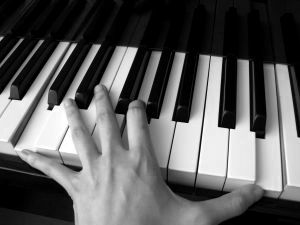 Some of the greatest figures in history are vividly remembered for the achievements they made in a certain sphere of life. And the association with it is usually so strong that we may be surprised to find out that this or that person had left some legacy in other spheres too, maybe less known and not so impressive but it is still there and is worth our attention. As practice shows, a creative person can be truly many-sided and succeed in a few things at once.
Some of the greatest figures in history are vividly remembered for the achievements they made in a certain sphere of life. And the association with it is usually so strong that we may be surprised to find out that this or that person had left some legacy in other spheres too, maybe less known and not so impressive but it is still there and is worth our attention. As practice shows, a creative person can be truly many-sided and succeed in a few things at once.
Today we would like to focus on some of the music heritage left by people who were quite far from professional music composing. Those are some geniuses who are rather known as poets, philosophers, astronomers and so on, but who at a certain period of their life sat down to create a music piece (or a few) of their own. Music lures everyone, after all.
Leo Tolstoy. It turns out that the famous Russian novelist was good in binding not only words but music sounds too. Although all he composed is just one and only waltz in F major but that is a remarkable piece of music for an amateur composer. The short one-minute waltz was composed in Tolstoy’s early youth years and was shyly played by Tolstoy to his friend Alelksandr Gol'denveizer and other guests in 1906. It is believed that it was then that Sergei Taneev, a composer, pianist and musicologist with phenomenal musical memory, silently went out of the room and wrote the composition down on a music sheet in order to save it for the future generations. The waltz created by the author of “War and Peace” could have remained unnoticed but for modern musicians who keet it ‘alive’. In 2004, Lera Auerbach, a Russian-born American pianist and composer, recorded the waltz for BIS, together with baritone Chiyuki Urano.
Friedrich Nietzsche. The 19th-century bright mind Friedrich Nietzsche besides philosophizing had a hand in composing as well. Unlike Tosltoy’s waltz that was pretty much to everyone’s liking, Nietzsche’s music was much more controversial. In fact, it caused a lot of criticism. So much criticism that Wagner once stood up and left the room while “The New Year's Echoes” piano duet by Nietzsche was performed, and conductor Hans von Bülow on seeing philosopher’s music score politely asked “Have you no better way to kill time?”. But there were approving reviews too, emphasizing the genius of Nietzsche trickling through his somewhat odd music works. Here is an example of a piano composition by the philosopher – “Heldenklage” (1862).
William Herschel. Astronomy and classical music? Sure. We know William Herschel first of all as a ground-breaking astronomer who discovered Uranus (1781), infrared radiation and built a spectacular telescope, among other accomplishments. But besides that, he left some musical legacy and it’s not just a piece or two: it’s an entire collection of 24 symphonies, a number of concertos and church music pieces! Herschel also used to play a few music instruments – cello, violin, organ, harpsichord and oboe. Though Herschel’s music is not among the popular classics often heard in the music halls today, there are still a few professional recordings of it, like the ones by “The London Mozart Players” or “The Kapellsolisten of Dresden”. Below is Herschel’s Symphony No.8.
Charlie Chaplin. The one of a kind comedian, actor and filmmaker of the silent era had obvious music composing talents that were even rewarded in 1952. Though Chaplin was never able to actually read music, he was still good at composing it. In fact, music to most of his films was composed by Chaplin himself. And the original music to the film “Limelight” even won an Oscar for the Best Film Score. Have a listen to the theme from the “Limelight” movie composed by Charlie Chaplin:
The list of amateur composers is not at all that short and the names of bright ‘unlikely’ composers can be traced throughout the history in all possible spheres. Thus, a few more examples of compositional activity include:
- Benjamin Franklin (a string quartet for 3 violins and cello)
- Henry VIII (a significant number of secular songs and instrumental compositions of Renaissance music, including “Greensleeves”)
- Richard Nixon (a piano solo performed by Nixon himself for the audience in 1961)
- Sir Anthony Hopkins (a classical music album “Composer”)
- Prince Albert (a number of music works dedicated to his wife Queen Victoria)
And the list goes on!
We hope you enjoyed reading about these outstanding figures and the musical side of their lives. It’s never too late to try yourself in something new. Who knows, maybe you have some hidden talents buried somewhere deep inside you. We wish you a lot of inspiration and encouragement in new endeavors, be it music or astronomy!